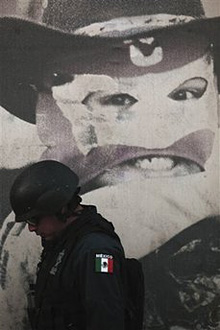
|  |  |  News Around the Republic of Mexico | August 2009 News Around the Republic of Mexico | August 2009  
Mexico Cleared for U.S. Anti-Drug Aid as Army Accused of Crimes
 Juliann Neher - Bloomberg Juliann Neher - Bloomberg
go to original
August 22, 2009


| | A Federal police officer walks by a photo set on the U.S.-Mexico border fence as he guards a scene where a Federal police vehicle was shot in Tijuana, northern Mexico, Thursday, Aug. 20, 2009. At least one Federal police officer was injured on the shooting. (AP/Guillermo Arias) |  |
The Obama administration is freeing up $85.4 million to help Mexico fight drug cartels, settling a debate over whether to withhold the money because of allegations the Mexican military is carrying out murders and other crimes.

The State Department sent members of the U.S. House and Senate appropriations committees a report on rights abuses in Mexico last week as the administration steps up efforts to crimp cross-border drug-smuggling and violence. The report is required before the department can spend a 15 percent chunk of 2008 and 2009 funds under the so-called Merida Initiative.

Some lawmakers and activists say the Obama administration is ignoring abuses under the crackdown. The report “is most notable for how little it says about the key issue - impunity within the Mexican military,” Senator Patrick Leahy, chairman of the Senate Appropriations Subcommittee on State Department and Foreign Operations, said in an Aug. 18 statement.

The Obama administration is making a priority of helping Mexico fight drug cartels as the Justice Department estimates that U.S. demand for illegal drugs has grown to about $17.2 billion a year. Forty-three people in the U.S. and Mexico were charged with smuggling narcotics and $5.8 billion in proceeds across the border In federal courts Aug. 19 and 20.

‘Manifestly Ineffective’

Calling Mexico’s military justice system “manifestly ineffective,” Leahy said that neither Mexico nor the State Department “has treated human rights abuses by the military, which is engaging in an internal police function it is ill- suited for, as a priority.”

Still, Leahy said he has backed more than $1 billion in aid for Mexico since June 2008 and will support more in the future to help solve its “complex” challenges.

Leahy, a Vermont Democrat, said earlier this month that release of the Merida funds would be premature because human- rights requirements hadn’t been met.

Press officials at Mexico’s defense ministry and attorney general’s office didn’t immediately return requests for comment.

President Barack Obama has lauded Mexican President Felipe Calderon’s efforts to fight the cartels responsible for 5,630 deaths in Mexico last year. Supporting those efforts is the Merida Initiative, a multiyear program begun last year to provide police training, communication and transportation assistance in Latin American countries battling criminal gangs.

Black Hawk Helicopters

So far, the U.S. has delivered about $150 million of the promised $1.1 billion in aid, leaving the Mexicans awaiting Black Hawk helicopters, made by Hartford, Connecticut-based United Technologies Inc., and machines to X-ray freight trucks for contraband.

The State Department will send the new money as soon as it decides how to allocate the funds, a department official said on condition of anonymity.

Under the Merida plan, the U.S. wants Mexico to improve the accountability of federal police forces and the cooperation of those personnel with civilian prosecutors and judicial authorities.

Human-rights proponents said Mexico hasn’t reformed its military justice system and doesn’t deserve the planned $85.4 million payment.

Complaints of abuses by the Mexican military have “increased six-fold in the last three years,” reaching 1,230 in 2008, Kenneth Roth, executive director of Washington-based Human Rights Watch said in a July letter to Secretary of State Hillary Clinton.

‘Egregious’ Abuses

The letter alleged “egregious human rights abuses” by “Mexican soldiers engaged in counter-narcotics and public security operations” including “rapes, killings, torture, and arbitrary detentions, and the failure to bring those responsible to justice.”

Obama, Clinton and Homeland Security Secretary Janet Napolitano defend Mexico’s handling of the war against drug cartels.

“The biggest, by far, violators of human rights right now are the cartels themselves,” Obama said Aug. 10 during the North American summit in Guadalajara. Obama said he was confident that Mexico’s police and military efforts were improving and that “transparency and accountability” and “human rights will be observed.”

In the first two months of 2009, there were 146 percent more drug-related killings in Mexico compared to a similar period in 2008, according to a State Department report.

Military Deployment

Calderon’s efforts to dismantle the gangs originally brought tens of thousands of Mexican soldiers to areas in which the cartels operate.

Calderon, 46, is now working to replace the army presence with 10,000 “well-equipped, paid” federal police officers who “have been vetted so that their backgrounds are such that at least they won’t start out corrupt,” Jim Jones, former U.S. ambassador to Mexico, said in an interview.

Human-rights advocates and lawmakers such as Leahy, 69, are pressing for Mexican military forces accused of rights abuses to be tried by civilian courts rather than military tribunals.

Such cases typically are heard in military courts, said Santiago Aguirre, a lawyer with the Mexico City-based human rights group Centro Prodh.

Human Rights Watch says military trials aren’t fair because the prosecutors and judges lack independence. Mexican military courts haven’t convicted any military personnel accused of committing a “serious human rights violation” in 10 years, the group said in a July statement.

To contact the reporter on this story: Juliann Neher in Washington at jneher(at)bloomberg.net. |

 |
|  |



